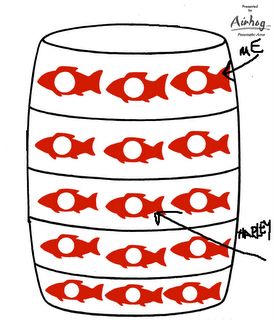
Given the premise that no one can be a Bad Jew because the label encompasses ethnicity, culture, and tradition as well as religion, why do I periodically feel like a Bad Jew?
This morning, Annie and I had a lengthy discussion regarding sexuality and halakha.
As you may have surmised, Annie and I have slightly different perspectives on Judaism.
Both of our Judaisms are complicated, but Annie’s is explicitly halakhic and usually within the rubric of Modern Orthodoxy.
On the other hand, I am the type of Jew that
Michael on
Jewlicious mocks (“satires”) on a regular basis.
I’m a post-halakhic, post-denominational, Brooklyn-dwelling, socially radical, academic Jew; and I don’t know what half those words mean.
I am precisely the type of Jew that your mother doesn’t want you to bring home, but that the YU boys hit on in hopes of slumming it for a night (and yes, Annie, they always bring their tefilin to daven in the morning).
From a halakhic perspective, if we are viewing Judaism solely through a religious lens: I am a Bad Jew.
There, I said it.
I have secret Bad Jew shame.
I choose not to be halakhic Jew.
For a myriad of reasons that I won’t delve into here, I do not consider myself bound by the Jewish law enunciated in Rabbinic Literature.
To the extent that I do observe some Jewish law (such as kashrut), I do so to connect to my religious heritage.
Those Jews who consider Judaism to be primarily a religion, defined by following halakha (whichever gloss of the halakha they deem authoritative), would rightfully question my Jewishness.
To them, I am not
really Jewish, even though I am biologically Jewish.
Back to our discussion on from this morning: sexuality and halakha. I have some emphatic views about sexuality, which I would be pleased to discuss with any of you, but not here and not now. Suffice to say, my views on sexual expression tend to align with Dan Savage. That fact, combined with my politics and my views on Judaism, leads to some fraught moments, when I emotionally react to Jewish law in marginally sane and slightly illogical ways. The following conversation occurred in reaction to this astounding post on The Kvetcher, who’s reflecting on a post written by The Failed Messiah.
Annie, far more staid than I, responds intelligently to my qualms and queries about Jewish law concerning sexuality.
Annie: The prohibition against pre-marital sex was derivative: don't have sex w/someone who is niddah, and then the rabbis said that young women can't go to the mikveh, keeping them in a perpetual state of niddah. In 15th Century, Spain had a community where young women were allowed to go to the mikveh, and have premarital sex, but they put a stop to that. Marriage is inherent to Judaism [historically from a biblical-criticism perspective] to differentiate from the non-Israelite rituals. Socially we get our example from the Torah, but not halakhically. There is no deorita law that premarital sex is out. It is all based on niddah. The anti-premarital sex stand is another example of Judaism bending to the outside social norms. Just like when Rabbi Gershon said you can only have one wife, so that people weren't having two wives, contrary to the common European practice. They wanted people to obey Jewish law above secular law, so they had to make competing laws prohibiting premarital sex because fornication was prohibited in Europe at that time. We get our social precedent for the preeminence of marriage from the bible, but not halakhically. We give primacy to the couples who are married, although in the case of the line of David, TWO women (Ruth and Tamar) seduce the men to whom they are not married. I think that everyone should go to the mikveh from puberty onward. I think then more people would observe niddah, if it wasn't an unnatural boundary at marriage.
Harley: Why did you stop being shomeret neggiah?
Annie: two reasons: 1) I found the halakha derivative and was a bit bothered by the fact that rabbis were legislating my body contrary to what I felt the intention was. It felt like a perversion of the halakhic process.
2) It was governing all of my male-female relationships, and not in the way that it intended. It made my male friends awkward, it sexualized all touch, and made people think all the time about the fact that they weren't touching me. Now, I am just not touchy and it is less of a concern. People aren't thinking, “oh, she's holding back.” My guy friends would stand a few feet away; every interaction was fraught. The rabbis started with an ideal that isn’t particularly Jewish, found a law that could be twisted to fit that ideal, and legislated. Having unmarried women not go to the mikveh is not a "fence around the law." It, in fact, makes it EASIER, not harder, to transgress the original issue of having sex with a niddah. The cases of rape almost always presume that a woman is not niddah, they rarely deal with it because sleeping with a niddah is an offense which I think merits death. It is considered adultery. It is a de'rabbanan. So if you go to the mikveh you break a rabbinic law. If you have premarital sex and are niddah, you break a Torah law
Harley: Niddah is from the torah?
Annie: “Do not draw close to a woman when she is a niddah; relations are forbidden [at that time]." (Leviticus 17:18)
Harley: I see these laws as leading directly to the objectification of women and the denigration of their bodies as dirty.
Annie: [The laws concerning niddah] are an example of the rabbis trying to exert social control in a way that I dislike and I dislike their halakhic process. The reason you don't have sex with a niddah is not because it is dirty, but to contain sex to the times when a woman is the most fertile. Back to procreation. (If you are going to talk logic instead of ritual.)
Harley: My frustration is that there seems to be no way to discuss extra-marital sex within the confines of Judaism without being privy to laws that I find offensive.
Annie: My issue is that you are reacting emotionally to the laws outside of them. You consider two things simultaneously which I believe false. I think that if you look for "reasons'" for the Torah's laws, you invalidate a lot of it. If you say: we keep kosher b/c... then you are lying because the torah does not say so [give reasons]. We are ASSUMING, based on historical evidence. So if you react to those rationales and base your beliefs on those, then you are not, in fact, reacting to the Torah and rejecting something out of hand for the incorrect reasons, but you are reacting to the justifications or historical reasons that you assume are the case. Religion is about separating holy from secular
Harley: I am not looking for justification. I don't believe there are necessarily rational bases to many laws and if there were they'd be beside the point. The point is the law, where we are now. I just disagree with their definition of holy. It goes against who I am at the base of my being.
Annie: Because you assume that tehora is about bodily purity
Harley: It is about being a body. To say that a woman is ritually impure because of bodily functions is about body, even if it's not about physical impurity.
Annie: When men have an "emission," they have to go to the mikveh before they can eat.
Harley: That’s wrong also.
Annie: Why? The idea of holy in Judaism is about separating from your body. That is why we fast on Yom Kippur: to have a "rest" from bodily functions.
Harley: Because that falls in the genre of law that also makes people feel that their natural bodily functions are wrong, evil, impure. It's about being a body and distancing ourselves from our bodies. It is the opposite of body positive, even if it's about ritual purity, the rituals surrounding the purity are physical and the cause of impurity is physical, so the effect, whether intended or not, is to place a pall over a person's body that you are impure at certain times. I understand separation of holy from unholy, pure from impure. I think it's wrong to say that someone's body is impure as a result of a natural bodily function. It's one thing if you've handled a dead body, but for a woman to be impure because she menstruates, whatever the justification, makes women feel impure, explicitly.
Annie: I think that that is a modern interpretation and it exists because we now tie mikveh to marriage and thereby patriarchy. Ideally a woman should go to the mikveh every time she has her period, independent of men, so that then she is suitable to enter the temple, just as a man who has an emission needs to go to the mikveh. It is a recognization of the fact that our bodies are vessels, and that within them resides a soul, something of higher purpose that is in some way eternal. It recognizes our humanity
Harley: Yes, the moment it was legislated by men, it became external and thereby has its effects. Mikveh is not inherently wrong. I know many women who derive meaning from going to the mikveh, but I cannot separate it from it's source (post-biblically, when it's transformed from a presumably female-derived ritual to a male-legislated ritual) and it's tied into the general history of labeling women's bodies as dirty
Annie: But you need to recognize that your issue is not with mikveh, but with the a) rationale given to it, b) the fact that men legislate it, and c) your idea that it is tied into dirtiness of women's bodies, which are corollaries to the original law.
Harley: The original law caused those corollaries

Annie: Right, but the point is that your problem is not with the Torah law, but with its execution. The original law existed and PEOPLE caused them. Now, women are beginning to be yoetzet halahkot and legislate over the laws of niddah (it is becoming more common in Israel). If you believe that the Torah was written by people, and that you cannot be bound by halakha b/c you don't like the structure of a group of rabbis deciding for you, there is no reason to observe. If I didn't believe that kashrut was mandated for reasons other than the "logical" reasons (i.e. pigs had that disease, to keep Jews and non-Jews separate) I wouldn't observe. I don't observe kemach yashon or cholov yisroel for just that reason, aside from the personal inconvenience. If you believe that the laws are at their base racist and isolationist, then why would you, as a modern person, follow them?
Harley: To invoke Neil Gillman: if your myth is broken, how do you rebuild?
The photos are from the Mikvah Project.













